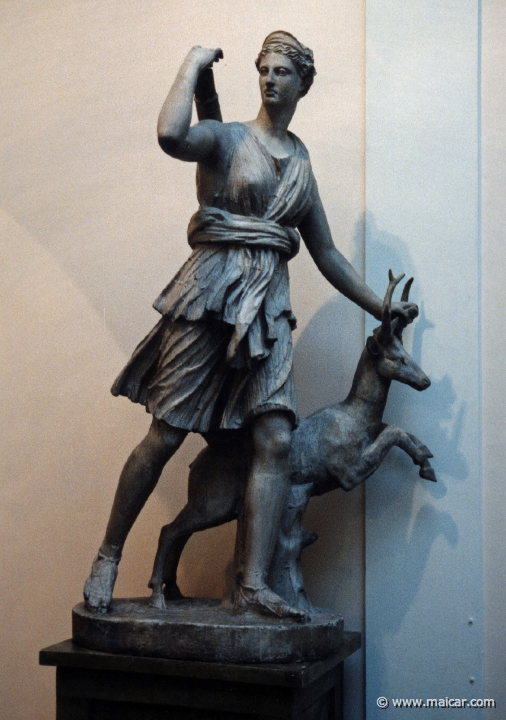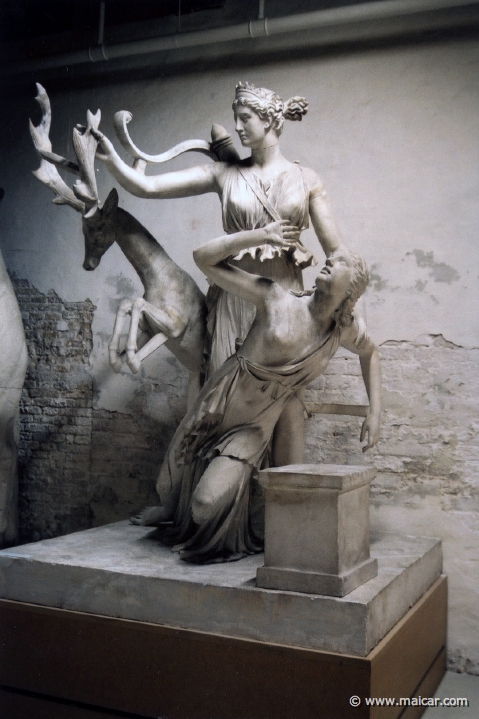|

|
Artemis. 6921: "Diana of Versailles", Roman marble copy after original from end of 4C - early 3C BC. Copy at Konstakademin, Stockholm.
|
|
Artemis devoted herself to the chase. She also discovered how to effect the healing of young children, and the foods which are suitable to the nature of babes. Goddess of the hunters, and watcher over streets and harbors, Artemis remained a maid, and those who have neglected this fact have been severely punished.
Mistress of the wilds
Artemis, who was born in Delos (one of the Cyclades Islands) just before her brother Apollo, has been called the Queen of Animals, and ever since many have thought that she, who is often seen followed by wild beasts, is the mistress of the whole of wild nature.
Realms are large and larger
That may seem a large realm; yet heaven is larger, and that is why Artemis appeared like a frightened pigeon, when Hera, angry at her on account of Artemis' support of the Trojans during the Trojan War, grabbed her by the wrists and boxed her with her own weapons, saying:
"Are you proposing to stand up to me? I know your bow and arrows, and what lioness you are to women, whom Zeus allows you to destroy at your discretion; but if you match yourself with me you will regret it. You would find it better sport to slaughter wild deer in the mountains than to fight your superiors." (Hera to Artemis. Homer, Iliad 21.470).
And having uttered these words, Hera seized Artemis and boxed her on the ears with her quiver, causing the arrows to come tumbling out of it. And while Artemis' mother Leto gathered up the crooked bow and the arrows, the mistress of the wild beasts fled in tears to be comforted by Zeus.
Artemis' delights
But when the immortals are at peace, Artemis moves across her realm of mountains, finding delight in the slaying of wild animals with her shafts of gold, and in playing and dancing with the NYMPHS that follow her. And when this huntress goddess feels satisfied, she goes to Apollo's great house at Delphi, and hanging up her weapons, she enjoys and leads the dance of the MUSES and the CHARITES.
Artemis' virginity
These are Artemis' pleasures, and since Aphrodite has no power over her, Artemis is well known for keeping love away and remaining a virgin. Yet Artemis, who sometimes punishes those who abandon their maidenhood, also brings release to women about to give birth. This is why the women from Troezen could say:
"Women's nature is an uneasy harmony, and with it is wont to dwell the slack unhappy helplessness of birth-pangs and their folly. Through my womb also has this breath darted. But I called on the heavenly easer of travail, Artemis, mistress of arrows, and she is always—the gods be praised—my much-envied visitor." (Troezenian women. Euripides, Hippolytus 165).
Artemis' virginity is honoured through all things that are virgin and pure in the natural realm. And so, for example, if a crown of flowers is offered to her, they should have been gathered in a virgin meadow, where no one comes. For the virginity of this goddess is pleased by the virginity of the untouched flowers which grow nourished by water that is pure like them.
Actaeon's misfortune
It is on account of this unsoiled purity that intruders of whatever kind may suffer the wrath of the goddess. Once, when Artemis in the summertime was bathing in a stream, Actaeon, having sought the same place for cooling himself and the dogs that he had exercised in chasing wild beasts, caught sight of her. The goddess then, in order to keep him from telling others about the incident, changed him into a stag, causing him to be mangled by his own hounds. Also the Cretan Siproites saw Artemis bathing, and for that he was turned into a woman by the goddess.
|

|
Artemis saving Iphigenia. 8623: Artemis og Ifigenia, rekonstrueret. Originalen af marmor findes i Ny Carlsberg Glyptotek. Romersk kopi efter aeldre forbillede hellenistisk 2./1. årh f.Kr. (Royal Cast Collection, Copenhagen).
|
|
Excess of continence
There are those who admire this inviolable virgin to such an extent that they, forgetting that exclusive devotion to one single god or goddess is not in accordance with human nature and life, attempt to be like her. But what is proper for gods is not for mortals and so these, having lost all sense of proportion, fall victims to their own excesses or, as in the case of Theseus' son Hippolytus 4, they see their arrogance punished by another divinity. For Hippolytus 4 worshipped Artemis and ignored completely other gods. Consequently, Aphrodite took revenge, and made Phaedra, his stepmother, fall in love with him. And since he refused her, Phaedra, fearing that he might accuse her to his father Theseus, falsely charged Hippolytus 4 with an assault. Theseus believed her, for those who are given to excesses are not deemed to be reliable, and having prayed to Poseidon that Hippolytus 4 might perish, obtained his wish.
The Sacrifice of Iphigenia
Some have said that this goddess demanded human sacrifice, and that she once, being particularly angry with Agamemnon, for having said, after shooting a deer:
"Artemis herself could not do it better." (Apollodorus, The Library "Epitome" 3.20).
… demanded that this impudent speech be punished. Accordingly, when the Achaean fleet was at Aulis, the goddess kept it wind bound until the Achaeans sacrificed Iphigenia, Agamemnon's daughter, as a remedy to that inconvenience. On the other hand, it has been told that when the girl was about to be sacrificed, she vanished, being saved by Artemis, who substituted for her a deer at the altar and transported her to Tauris, where she became her priestess. In this barbarian country, which today is called "Crimea" and is the large peninsula in the northern coast of the Black Sea, Iphigenia lived several years sending strangers to the altar, where they were butchered by attendants in the course of nonsensical rites supposed to honour the goddess. But Iphigenia herself says:
"… Men of this country, being murderers, impute their sordid practice to divine command. That any god is evil I do not believe." (Iphigenia. Euripides, Iphigenia in Tauris 390).
Callisto
Artemis is also charged with having punished Callisto, who had sworn to remain a maid, but let herself be seduced by Zeus, who approached her assuming the shape of Artemis. It is told that when the goddess noticed that Callisto was pregnant, she questioned her as to the reason for her swollen form. And as the girl replied that it was the goddess' fault, Artemis, angry at this reply, changed her into a bear.
The Calydonian Boar
The appearance of the Calydonian Boar, which ravaged the country until it was hunted by a group of well known heroes, is also attributed to Artemis, who was angry at King Oeneus 2 of Calydon because he, in sacrificing the first fruits of the annual crops of the country to all the gods, forgot this goddess alone. So Artemis, they say, sent a boar of extraordinary size and strength, which destroyed the cattle and the people, and prevented the land from being sown.
Shafts of plague
Artemis' golden arrows may also be, as those of her brother Apollo, the shafts of disease and death, as experienced by the NIOBIDS, who were killed by them after Queen Niobe 2 of Thebes provoked Leto with her insults. The latter's sweet children then, in order to avenge her, shot most of the NIOBIDS with their arrows, thus leaving the Royal House of Thebes desolate by plague (for that is what their arrows mean).